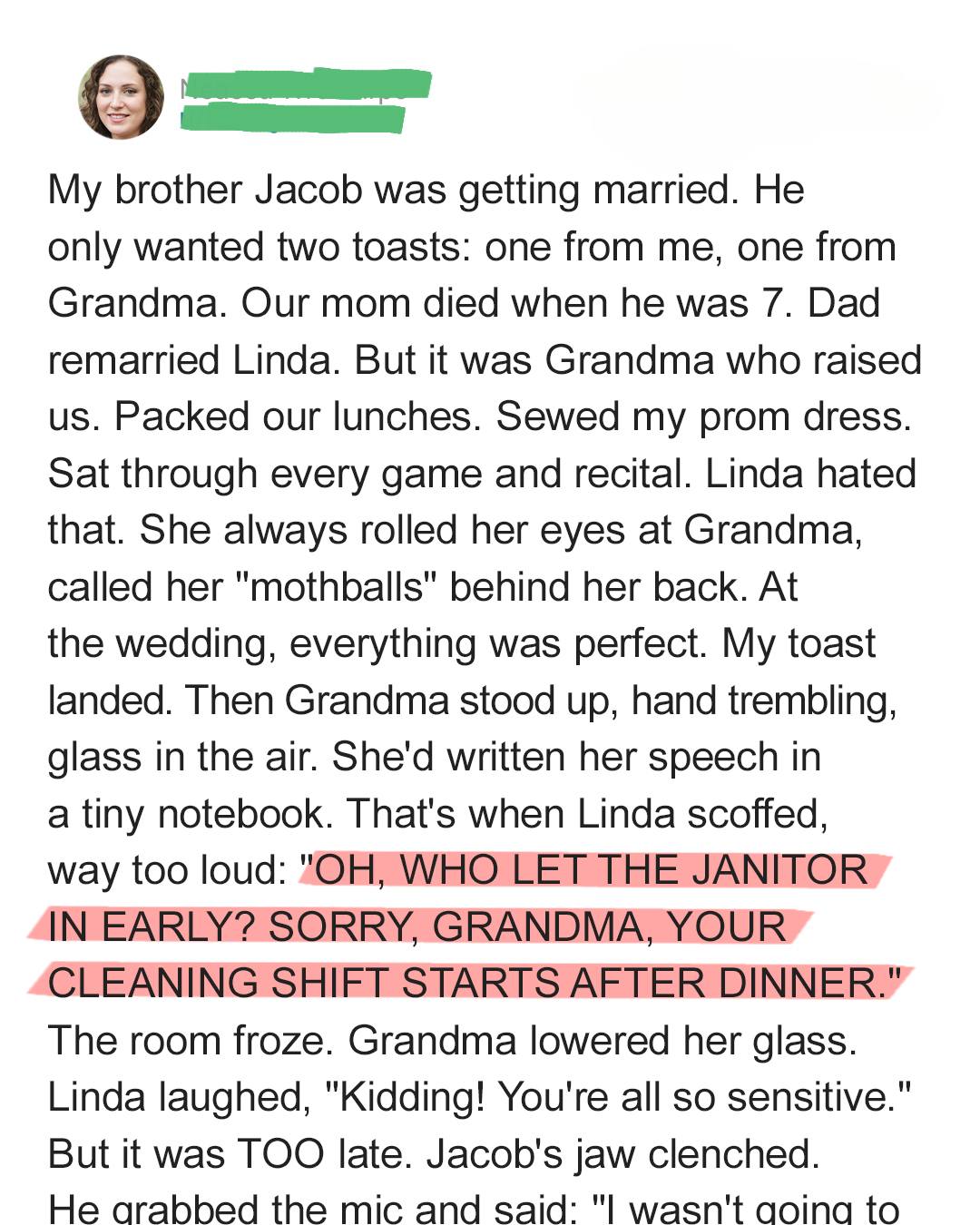I always knew that my stepmother, Linda, had a remarkable ability to turn everything into a story about herself. Attention was her lifeline; if she wasn’t the one receiving it, she acted as if she couldn’t breathe. For years, my brother Jacob and I tiptoed around her, protecting her fragile ego and sharp tongue for our father’s sake. But as Jacob’s wedding day approached, a heavy unease settled in my stomach. I knew Linda wouldn’t stand aside and let someone else shine, but I could never have imagined just how cruel she would become—or that her attempt to steal the spotlight would banish her from our hearts forever.
But to understand that night, you need to understand the woman she chose to humiliate: our grandmother, Ruth. When our mother died, I was seven and Jacob was five. Our world shattered into sharp little pieces. Dad was so drowned in grief he could barely function, let alone raise two traumatized children. That’s when Grandma Ruth stepped in. She didn’t just visit—she saved us. She cooked for us, left little handwritten notes in our lunchboxes every day, stayed up with me at night when I was scared, and sewed my prom dress with her tired hands. She never missed a single event in our lives. She wasn’t just a grandmother; she was the gentle foundation on which our lives were rebuilt.
Linda came into the picture five years later. From the very beginning, she saw Grandma not as a matriarch to respect, but as a threat to eliminate. Loud, flashy, and desperate to be seen as the “new mom,” she wanted the title without the sacrifice. Over the years, she made snide remarks about Grandma, while Dad, terrified of conflict, let it happen. But we never forgot.
When Jacob got engaged to Sarah—a wonderful woman who adored Grandma—they made a clear decision about the wedding speeches: only I and Grandma Ruth would speak from the groom’s side. Linda, when she found out, erupted into her usual dramatics. She complained about “etiquette” and “respect,” but Jacob didn’t budge. He knew giving Linda a microphone was like giving a toddler a loaded weapon.
The wedding day was magical. A restored barn, golden lighting, and genuine joy. Linda, though a bit overdressed for her role, behaved. Or at least appeared to—her wine glass never seemed empty.
When the speeches began, everything was perfect. I spoke first, and then it was Grandma’s turn. Frail but elegant, she stepped to the microphone. Her voice carried a story of loss, strength, and the love that stitched our family back together. The room was entranced.
Until the silence was shattered.
A loud, mocking laugh cut through the air. Linda. Leaning back in her chair, swirling her wine, wearing the smirk of someone who believes they’re being funny.
“Oh, enough already, Ruth,” she slurred, loud enough for the microphones to catch. “This is a wedding, not a funeral. Let the young people celebrate.”
The silence that followed was no longer magical—it was horrified.
Grandma froze, small and hurt under the lights. I stood, but Jacob was faster.
He walked to her, placed a hand on her shoulder, and took the microphone. He didn’t yell, but every word carried years of pain.
“This woman,” he said, pointing at Grandma, “raised me when my world collapsed. She taught me everything. She is the reason I am the man I am. And she deserved more than your respect—she deserved your silence.”
Linda tried to speak, but he cut her off.
“This is exactly why you weren’t invited to give a speech. You don’t understand that love isn’t about being the center of attention. Love is action, not empty words and cruel jokes. If you cannot honor the woman who raised me, then you don’t belong here.”
The room erupted into applause—not polite, but fierce. Even Dad didn’t defend her this time. Linda rose, red-faced, grabbed her purse, and left without looking back. No one stopped her.
Grandma took a deep breath, wiped away a tear, and finished her speech with breathtaking grace:
“My wish for you both is simple. May your love be stronger than pride, softer than regret, and always louder than cruelty.”
When it was time for the mother-son dance, Jacob didn’t call Linda. He approached Grandma instead.
“May I have this dance?” he asked.
We watched her rest her head against the boy she had raised, and the entire room seemed to exhale. The tension lifted, like a heavy fog finally clearing.
Linda never attended another family event. Dad eventually left her. But that night, nothing else mattered. We simply watched Jacob and Grandma dance, finally understanding the truth that had been waiting to be spoken: real family isn’t blood or documents—it’s the people who show up, day after day, when your world is falling apart.
